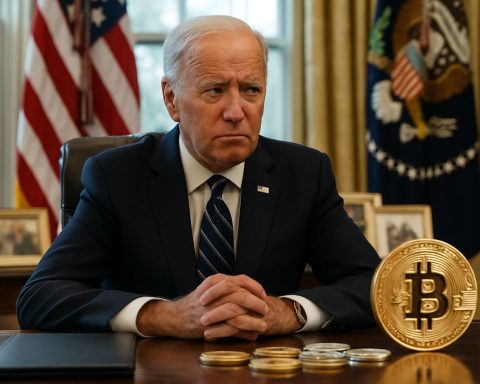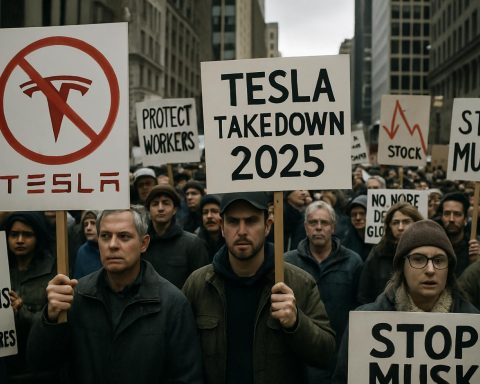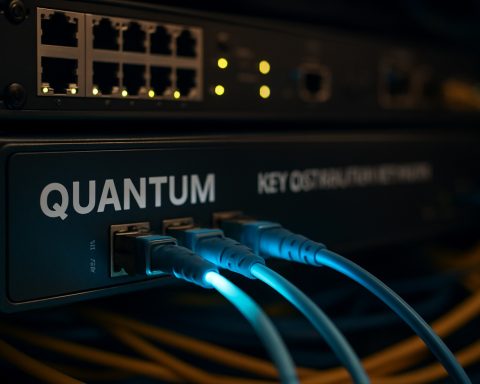- Bitcoin is at the forefront of global financial discussions, transitioning from niche interest to mainstream phenomenon.
- Eric Trump and industry leaders highlight a rush among sovereign wealth funds and corporations to acquire Bitcoin, viewing it as digital gold.
- An important merger between American Bitcoin and Gryphon Digital Mining sparks significant market activity and a predicted Nasdaq listing by late 2025.
- Investor enthusiasm is high, evidenced by Gryphon’s stock surging over 200%, driven by the upcoming Bitcoin halving event and strategic resource pooling.
- Political challenges arise, with Democrats expressing concerns over cryptocurrency regulation and potential conflicts of interest involving the Trump family’s crypto holdings.
- The Bitcoin narrative reflects a dynamic intersection of financial opportunity and political scrutiny, marking it as a present-day battleground for influence and control.
The world is buzzing, and Bitcoin is at the heart of the conversation. In a riveting discussion at the Consensus 2025 conference, Eric Trump painted an electrifying vision of a world racing to secure Bitcoin, the digital gold that everyone, from sovereign wealth funds to some of the planet’s largest corporations, seems to be hoarding. This isn’t just idle talk overheard on planes or whispered in boardrooms; it’s a testament to Bitcoin’s ascension from niche interest to mainstream financial phenomenon.
As Eric Trump shared insights alongside Hut 8’s CEO, Asher Genoot, the scene was clear. Bitcoin has transcended its maverick roots. We’re witnessing a global scramble where major industry players and influential entities are competing for a piece of the digital asset pie. Gone are the days when Bitcoin was the preserve of techies and libertarians; now, its allure captivates the financial world’s elite.
Bolstering this sentiment was the recent announcement of a significant merger that has sent shockwaves through the financial community. American Bitcoin, co-founded by the Trump brothers and housed under the umbrella of Hut 8, has penned an agreement to merge with Gryphon Digital Mining. This union isn’t just your run-of-the-mill merger; it’s an all-stock swap that promises to reshape the digital mining landscape. The promise? A Nasdaq listing by the third quarter of 2025 that could open the floodgates for regulated market capital influxes to the mining industry, bypassing direct Bitcoin holdings.
Investor reaction was instantaneous and euphoric. Gryphon’s stock skyrocketed by over 200% following the merger news, with Hut 8 stocks also enjoying substantial gains. It’s a clear signal: Wall Street’s appetite for anything linked to the impending Bitcoin halving event is voracious. The tactic is straightforward yet strategic—merge to pool resources, bolster hashing power, and expand influence before the 2024 reward reduction tightens the supply and inevitably boosts prices.
But the Bitcoin fever isn’t met with universal applause. The political arena is rife with skepticism and concern. A cohort of House Democrats recently exited a digital assets hearing, dissatisfied with the oversight on ethical discussions. In an emphatic move, Senate Democrats have urged President Donald Trump to divest the Trump family’s cryptocurrency holdings, spotlighting potential conflicts of interest should policy shifts favor the family’s substantial crypto investments—a portfolio that accounts for nearly 40% of their net worth, approximately $3 billion.
The scene is set—a volatile mix of burgeoning opportunity and mounting political friction. As the narrative unfolds, one truth prevails: Bitcoin is no longer just the future of currency; it’s the present battleground where global financial giants and political entities strive to stake their claim. With each player aiming to seize the moment, the world watches, captivated by the drama of digital dominance.
The Bitcoin Frenzy: How Major Players are Reshaping the Crypto Landscape
Bitcoin has evolved far beyond its initial purpose as a maverick digital currency for tech enthusiasts and libertarians. It has now reached a pivotal moment in its journey, becoming a formidable financial asset that attracts sovereign wealth funds, major corporations, and political scrutiny. As evidenced by the riveting discussions at the Consensus 2025 conference, major stakeholders are racing to acquire this digital gold before the market tightens with the approaching Bitcoin halving event in 2024.
Industry Trends and Market Forecasts
1. Bitcoin’s Mainstream Ascension: Bitcoin has gained traction as a hedge against inflation and economic uncertainty. With institutional involvement rising, it is being treated akin to gold, accessible for digital-era investors. According to a report by MarketWatch, the global cryptocurrency market is anticipated to reach $5 trillion by 2030, with Bitcoin projected to maintain a dominant share.
2. Mergers and Acquisitions in Crypto Mining: The merger between Hut 8 and Gryphon Digital Mining exemplifies how companies are consolidating to enhance hashing power and influence. This trend is expected to accelerate as companies prepare for increased market demands and potential price hikes post-Bitcoin halving. Nasdaq’s regulation of these new entities adds a layer of legitimacy, attracting conventional investments.
Pressing Questions and Expert Opinions
Why are institutional investors so interested in Bitcoin?
Institutional investors view Bitcoin as a store of value similar to precious metals. Its capped supply and deflationary nature make it attractive in times of currency devaluation. As per JPMorgan’s analysis, Bitcoin could potentially rival gold, significantly appreciating its value.
How does the Bitcoin halving affect the market?
Every four years, Bitcoin’s mining rewards are halved, reducing the rate of new Bitcoin creation. Historically, these events have spurred price surges due to supply constraints against increasing demand.
What are the potential political implications?
The political landscape is complex. Some politicians express concern over the cryptocurrency’s potential to undermine traditional economics. Additionally, ethical considerations regarding politicians’ holdings and policy influence are generating political tensions, as seen with Senate Democrats urging President Trump to divest.
Challenges and Controversies
While Bitcoin offers profound investment opportunities, it also faces significant challenges:
– Regulatory Scrutiny: Governments worldwide remain divided, with some embracing Bitcoin while others develop strict regulations, fearing economic instability and fraud. Efforts continue to create a balanced regulatory framework that supports innovation yet safeguards financial systems.
– Environmental Concerns: Bitcoin mining’s energy consumption is a growing concern. Many companies are innovating to leverage renewable energy, but environmentalists urge for more substantial commitments to sustainability.
Recommendations and Quick Tips
– For Investors: Diversify your portfolio and consider regulated crypto funds or ETFs to mitigate risks while capitalizing on Bitcoin’s growth potential.
– For Tech Enthusiasts: Stay informed about technological advancements in blockchain and decentralized finance to understand emerging possibilities and innovations.
– For Policy Makers: Engage with crypto stakeholders to shape pragmatic policies. Consider both the financial and environmental impacts of cryptocurrencies to foster a more resilient and diversified economic environment.
To discover more about the evolving Bitcoin landscape and its broader implications, visit the official site of Consensus for in-depth insights and expert-led discussions.
In conclusion, as the digital currency landscape rapidly transforms, strategic positioning, informed decision-making, and foresight into potential implications will define who stands to benefit most in this high-stakes financial frontier.










